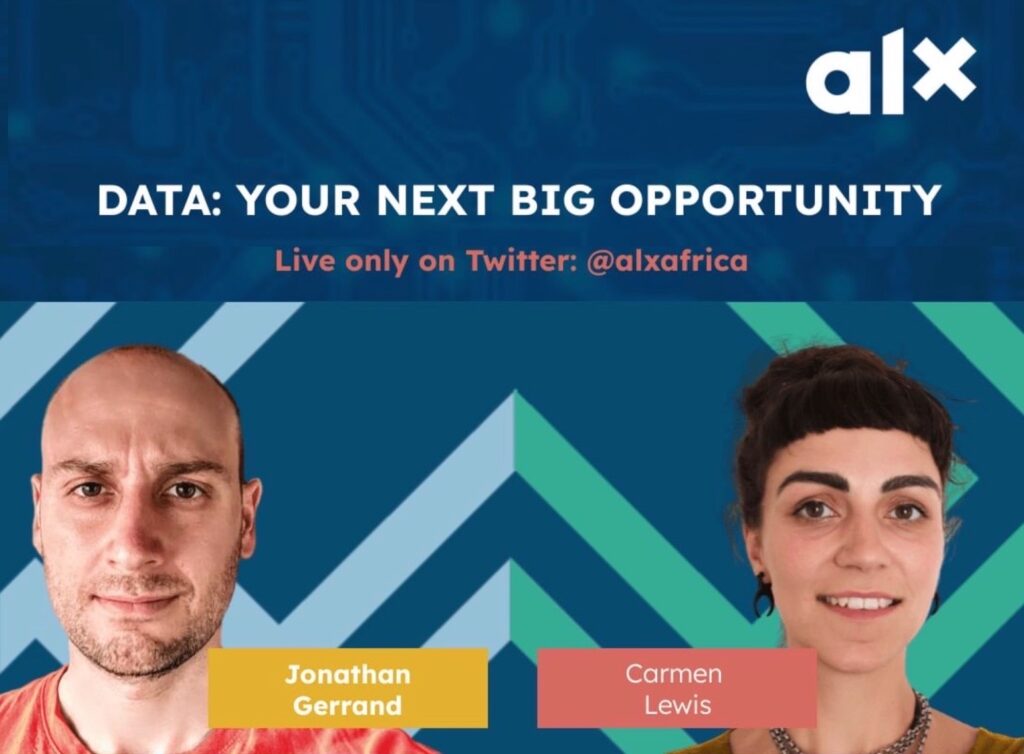Data: Your Next Big Opportunity
- 07 Apr 2023
- 8 min read

ALX recently hosted a Twitter Spaces conversation with ExploreAI to discuss all things data. Hosted by Brand Digital Lead at ALX, Kuda Mangwe, the purpose of the chat was to discuss two of the newest ALX courses – Data Science and Data Analytics – developed in partnership with ExploreAI Academy.
ExploreAI is a data company that uses advanced techniques in AI, cloud, and data engineering to solve business problems and advance industries in this new era of big data. Its learning institution, ExploreAI Academy, provides access to data engineering and data science education for people across Africa to help them upskill and build careers in data.
Kuda was joined by Carmen Louise, Head of Curriculum at ExploreAI Academy. She is responsible for building the coursework for the ALX Data Science and Data Analytics courses. Her main focus is to ensure that everyone participating can future-proof their skill sets in data for a long, fruitful career. Kuda was also joined by Jonathan Gerrand, Senior Data Scientist and Tech Lead of the product arm of Explore Utilities at ExploreAI.
The conversation highlighted how massive the data industry has become, with companies small and large using Big Data to influence modern ways of doing business. During the discussion, we delved into the differences between data analytics and data science, answering key questions like:
- What is it like working in the data industry?
- What does it take to be successful in the data industry?
- What skills are needed to become successful in this industry?
- What course(s) are the right path for someone looking to kickstart their data career?
Below you’ll find a condensed recap, with key highlights, of part 1 of the Twitter Spaces conversation.
Q: What is the difference between a data scientist and a data analyst?
Gerrand: Both have so many career options. Typically, we see a role in data analytics having a lot of context within a business. As a data analyst, you’ll see yourself being drawn more and more into the working of a business and so you naturally can go along that path.
As a data scientist, the roles also go into business, but you can find yourself specialising as a machine learning engineer, for example, or a data engineer. These are closely-related fields that are exploding at the moment and going forward.
As a data scientist, you go a little bit further. You’ve got the skills of a data analyst that are augmented by not only doing descriptive activities – not only saying “how do we make sense of the data that’s in front of us?” – but also “how can we be a bit more prescriptive with it?” This means you don’t only lay the groundwork for what the data is telling us now, but also look ahead and decide proactively what the data could be telling us about future actions we need to take, or how to better respond to the data we currently have on hand.

That prescriptive action speaks to some more advanced statistical and computational skill sets that are often required. These are known on a day-to-day basis as things like Artificial Intelligence (AI) or machine learning. We can apply these additional skills to the data in order to model it in a way that allows us to be prescriptive.
So a data scientist, just like a data analyst, would be able to go in front of a group of individuals and business representatives and be able to, very succinctly or in a powerful way, say how the data is communicating various movements and trends. However, while a data analyst would typically only work with structured data that is already collected, a data scientist would additionally work with unstructured data – be it natural language, text, or images. To work with unstructured data, you have to have an arsenal of tools or skills – such as proficiency in high-level languages like Python – in order to do analysis.
Both are very similar in that, in both roles, you’re a data practitioner who deals with data. The difference comes in with being mainly focused descriptively or prescriptively in the way you work.
Q: Which field provides more career opportunities?
Gerrand: Both have so many career options. Typically, we see a role in data analytics having a lot of context within a business. As a data analyst, you’ll see yourself being drawn more and more into the working of a business and so you naturally can go along that path.
As a data scientist, the roles also go into business, but you can find yourself specialising as a machine learning engineer, for example, or a data engineer. These are closely-related fields that are exploding at the moment and going forward.
Both of these hold gainful futures for you and it really comes down to your preference. Is it the interaction between a business and its data, from a descriptive angle, that gets you going, or is it the actual science of the data?
Q: What does a day in the life of a data scientist or a data analyst look like? What do you wake up and do?
Gerrand: This greatly depends on the domain you’re working in. Especially in today’s world – within Africa and our emerging economies – it’s down to the maturity of the business you’re in as well. As a data scientist in a more mature company (I’ll use ExploreAI as a reference here for myself) you’ll often find yourself working alongside other data practitioners. I mentioned the role of a machine learning engineer and a data engineer slightly early on and so, it’s important to have context.
If you’re in a slightly less mature organisation that has realised the value of its data, but only has a small group of data scientists, you may find yourself working with a lot of the raw data that’s at your disposal. You may spend a lot of your time cleaning or engineering the data, or working on the underlying transformations that are required to make sense of it. You may also be responsible for creating the data pipelines that move the data into a space where it can be analysed and modelled. In an environment like that, you’ll be doing the role of both a data engineer and a data scientist.

Within the product space, I have the opportunity to advise several teams that have several data scientists working within them. Typically, what happens is we start with the general business questions that our clients may have, since we primarily operate in the utility sector at ExploreAI. This involves having several meetings with the client and domain/subject matter experts to understand their needs. Following this, we dive into getting to know the data itself.
If you’re working for a more mature company like ours, you’ll likely be a part of a team of data engineers who have streamlined the data into an easily understandable format, allowing you to engage in incremental modelling. It’s important to understand that in this process, we don’t just stick our heads down to code and deliver a model to our clients right after. It’s a very iterative process that involves analysing the data and providing insights to clients, while working together with domain experts who advise on where to focus most of our attention. Ultimately, the client decides whether the data and insights speak to their end business goal.
It’s very exhilarating to see how different departments interact with the data and iterate the insights according to the client’s business goals.
Q: How much do data scientists, data analysts, and data practitioners make, especially in Africa?
Gerrand: This would vary greatly depending on your level of seniority. In general, this profession pays highly from the start. A junior data scientist can earn anywhere in the range of $22,000 – $35,000 USD per year. As you grow in seniority, that can go up quite a bit to anywhere towards $40,000 – $50,000 USD per year, even increasing if you find yourself in a great position. The salaries are overall quite competitive compared to other fields.
ALX, in partnership with ExploreAI, is offering cutting-edge courses in Data Analytics. Apply to join one of these world-class programmes and discover your next Big Opportunity with a career in Data.
Part 2 of this Twitter Spaces conversation will explore these programmes in more detail, highlighting the lucrative careers they prepare you for.
